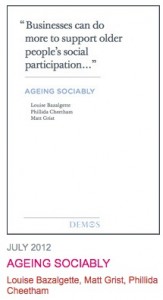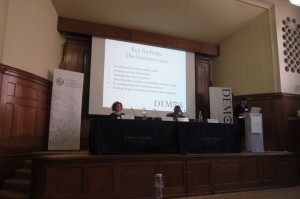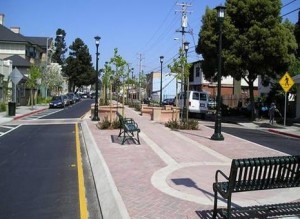OC 46: Are Cities Open for Age?
Fear of Age
A major scare story reinforced by the lack of recovery from the banking disaster is built around the fact that societies in the developed world are aging. The England and Wales 2011 census data just published confirms that people are living longer and they start to make more babies. Migration is the joker in the pack which blurs the straight forward narrative about younger people being burdened by their elders.
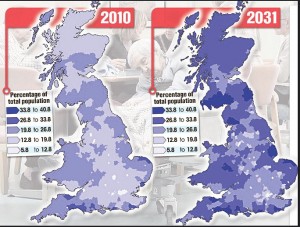
1_dia Population map UK 2010-2031
source: http://img.thesun.co.uk/multimedia/archive/01098/SNN0517GXB-682_1098880a.jpg
Demos, http://www.demos.co.uk, a London based “think tank focused on power and politics” organised a discussion around its latest research ‘Ageing Sociably’ funded by the Calouste Gulbankian Foundation. It invited representatives of businesses which encompass age issues in their social corporate responsibility, voluntary organisations dealing with the needs of older people, local authorities, housing associations and the research community to exchange their experiences on issues highlighted by the research.
Paul Burstow, the Minister of State for Care Services commented on the draft white paper just published on how to cope financially with care for the elderly. It is not all about money though, and the Demos study looks into how “business can do more to support older people’s social participation”. This is a welcome departure from passive assistance culture which is often enforced on older people who are keen to remain active and continue to make a contribution to social life. Liz Bramley of the Co-operative Group reviewed the many measures the group is taking to ease transition from work to retirement, to include older people among their staff and to maintain links with their pensioners.
Commodifying Age
At a time when everything is being commodified and the only thing that matters is the balance sheet bottom line, it is tempting to make a business case of ‘grey purchasing power’ and constrict older people to conspicuous consumption. Not all of them are wealthy and certainly not all want to be reduced to spending money. Ageism is a major obstacle to well-being in later years, as aging well is about remaining a valued part of society, performing meaningful activities, continuing to learn and wonder, instead of being discarded, isolated and lonely and made to feel surplus to requirement.
Someone blamed the baby boomers for the ‘youth cult’ they had instigated which is now coming home to haunt them. Active members of the fourth age asked why they were rarely invited to the table where the fate of older people was decided by politicians and bureaucrats. Why is there legislation against racial, ethnic, religious, sexual, gender, disability discrimination while age discrimination goes scot-free? Is it about an easy group to push over?

5_dia Style choice of older women
source: http://designyoutrust.com/2011/06/advanced-style-r-e-s-p-e-c-t-for-the-elderly/
Ageing Sociably?
A major issue is that this group is not homogeneous and needs differentiated treatment. Those who are ill and frail need proper medical and social care and improvements proposed in the white paper towards more humane treatment and more choice for elderly people is a step in the right direction. However, other older people need change in social behaviour, as well as the physical environment.

6_dia Public art celebrating older people in Bilbao
source: http://www.interiordesignphotos.co.uk/2011/10/12/celebrating-the-elderly-floating-bubble-heads-outside-bilbao-video/
The Demos study focused on how businesses could change their approach to this age group to their own benefit, but the discussion brought up many other obstacles to older people remaining active and mobile.
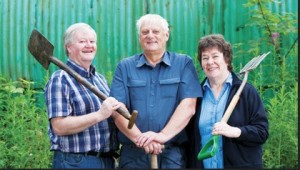
7_dia Age unlimited active gardening
source: http://www.nesta.org.uk/areas_of_work/public_services_lab/ageing/age_unlimited_scotland
There was great worry about removing bus passes, a genuine passport to mobility for older people, at a marginal cost as they often take up seats which would be empty otherwise. This mobility is important for all older people and moves them from their cars to public transport. Means testing would cost more than the bus passes and would introduce yet another layer of segregation. Many older persons are income poor even if they may have assets which have increased in commodity value due to outside forces but not in ‘use value’ as the places where they live. Pensioners are taxed and contribute back if they earn. Removing this mobility would increase loneliness and, counterproductively, the physical and mental health bill. Most importantly it would reduce quality of life of older people to which they are just as entitled as the rest of society.

8_dia: In front of bus with bus pass
source: http://www.flickr.com/photos/fredpipes/with/436273671/ – photo_436273671
Once they move in the city, older people encounter many other obstacles, some due to urban design, some to planning which is driven by stereotypical living patterns of home to work journeys and reliance on the car, thus it would be worthwhile looking at how open cities are to this age group.

